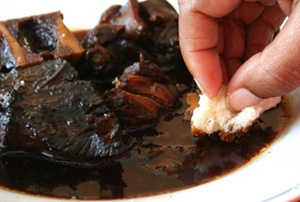THIS SUPER ROOT PRESERVES MEAT INDEFINITELY!
Native Indians of South America used this root to make a black juice called Cassareep that preserves meat for long periods of time.
Some even say INDEFINETLY.
This Super Root Preserves Meat Indefinitely!
What is sure is that the PepperPot was their freezer. The PepperPot was was the pot where the meat was preserved, and also the preserved dish.
Nowadays, most Cassareep is exported from Guyana, South America and is available in bottled form. It can be bought in many stores in the USA, Canada, UK, Australia or on Amazon.
Cassareep purpose is twofold:
One to preserve meat and two, in particular its wonderful bittersweet flavour. Cassareep can be used as flavouring to dishes as well as certain soup recipes.
Related: How to Make Pemmican – The Ultimate Survival Super-Food
Now the Antiseptic quality of Cassareep is the wonderment of the Root:
This property allows food to be kept outside of the fridge and in open air as long as the mixture itself is kept free from outside pollutants such as saliva.
As long as you add additional game or meat that you buy hunt or trap, you add additional Cassareep, this can be continued, as stated, indefinitely.
There is a legend according to a lady Betty Mascoll of the Caribbean island of Grenada that there was a Pepperpot (A dish made from Cassareep and meat) that was maintained like this for more than 100 years! In Dutch Guyana also called Suriname, Dutch planters reportedly had these dishes in daily use and kept them cooking for an incredible amount of years. This was also used in many country clubs and businessmen’s clubs.
The “preserving process” is quite simple. Here’s what you need in order to make the “PeeperPot Stew”:
- 1 bay leaf
- 4 cups water
- 2 sticks cinnamon spice
- 12 heads of clove 1/2 cup chopped celery
- 3 teaspoons brown sugar 2 table spoons seasoning salt
- 1 hot red whole hot pepper
- 1/4 teaspoon dried thyme
- 2 teaspoons black pepper
- 5 lbs salt beef (chopped)
- 5 lbs cow heel (chopped) optional
- 5 lbs beef (chopped)
- 1 bunch fresh parsley – chopped
- 1 teaspoon salt or (or to taste)
- 7 Ounces Cassreep
Instructions:
Wash and season the meat with black pepper and salt.
Place all ingredients in a large pot of water, approximately 4 – 5 cups of water, enough to cover the meat.
Add peppers to flavor
 Cover and bring to a boil for about 2 hours, or until meat is very tender, and the water is 1/4 of its original content. This water becomes your pepper pot sauce.
Cover and bring to a boil for about 2 hours, or until meat is very tender, and the water is 1/4 of its original content. This water becomes your pepper pot sauce.
Put the content into a jar or keep it in the bowl.
Simply warm and re-use any time you are hungry.
Using Cassareep prevents this dish from spoiling for at least a few weeks un-refrigerated.
To keep the Pepper Pot lasting for years on end, native Indians constantly added Cassreep and game meat to the pot… and boiled it again every time they added new stuff.
Important:
1 – Using a dirty (un-washed) spoon or a spoon that was used in any other food will deteriorate the Pepper Pot and cause spoilage almost immediately;
2 – Never eat directly from the pot. If you use a spoon, after you eat the first one you will infest the pot with bacteria from your saliva which will spoil the whole pot. Also: never taste it with the same spoon more than once – directly from the pot.
3 – Pepper pot should be served the day after cooking but it gets tastier with age (after the first week)
4 – Do not use/eat the root directly – it is poisonous; do not attempt to extract the Cassareep from the root unless you know what you are doing.
The medical properties and the antiseptic uses circle around eye infections such as Conjunctivitis and corneal ulcers but the Reverend J.G. Wood who wrote Wanderings in South America – 1879was widely criticised apparently for not mentioning the properties of cassava juice which “enables the Indian on a canoe voyage to take with him a supply of meat for several days”.
We should thank the native Indians of South America for their practical wisdom.
Final Word
We are straying away from our roots on a dangerous road from which there will be no turning back. And the good and bad news is that we are the last generation that can truly do something about it.
We no longer know how to live without refrigerators, without cars, without phones or without supermarkets.
What will you do tomorrow if you simply are unable to buy things?



